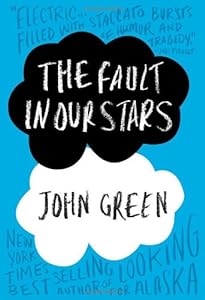The Fault in Our Stars': not a “cancer book”

The Fault in Our Stars
There's more than one way to tell a sad story. The 16-year-old narrator of The Fault in Our Stars, John Green's remarkable teen novel, believes that when it comes to the telling of sad tales, "you have a choice in this world." She goes with "the funny choice."
So does Green in a pitch-perfect, elegiac comedy about star-crossed lovers who meet at a support group in Indianapolis for kids with cancer. It's alternately grim and sweet.
Hazel Lancaster, the narrator, has a tumor as incurable as her sense of irony. Cancer booklets and websites are wrong, says Hazel, who has terminal thyroid cancer: "Depression is not a side effect of cancer. Depression is a side effect of dying."
Augustus Waters, 17, a former basketball star, is in remission after losing an leg to cancer, "an excellent weight-loss strategy," he quips. "Legs are heavy!"
He favors a cigarette between his lips — unlit. "A metaphor," he says. "You put the killing thing right between your teeth, but you don't give it the power to do its killing."
Their flirting is charming. He tells her: "You are so busy being you that you have no idea how utterly unprecedented you are."
They're serious readers who love to play with words and poke at the clichés of CancerWorld. When someone says of a boy who died, "he fought hard," Hazel thinks to herself, "as if there were another way to fight."
She's angry and funny, and most delightful of all, thinks about what her parents must be thinking. She worries that when she, "professional sick person," dies, "they'd have nothing to say about me except that I fought heroically, as if the only thing I'd ever done was Have Cancer."
Augustus shares a passion for Hazel's favorite novel, a novel imagined by Green. An Imperial Affliction (or AIA, as Hazel calls it) is narrated by a girl named Anna with a rare blood cancer.
"But it's not a cancer book," Hazel says, "because cancer books suck."
In cancer books, she explains, "the cancer person starts a charity that raises money to fight cancer," which "reminds the cancer person of the essential goodness of humanity and makes him/her feel loved and encouraged because s/he will leave a cancer-curing legacy."
In AIA, Anna decides that starting a cancer charity is a bit narcissistic, so she starts a charity called The Anna Foundation for People with Cancer Who Want to Cure Cholera.
AIA ends mid-sentence, the ultimate unresolved ending. (Hazel says, "I know it's a very literary decision and everything and probably part of the reason I love the book so much, but there is something to recommend a story that ends.") And that leads to a search for its reclusive author.
The Fault In Our Stars has both a big plot twist and an ending. It's not exactly happy. It's not that kind of book. But it will linger long and hard in the minds of teens and former teens. Just don't call it a cancer book.
No comments:
Post a Comment